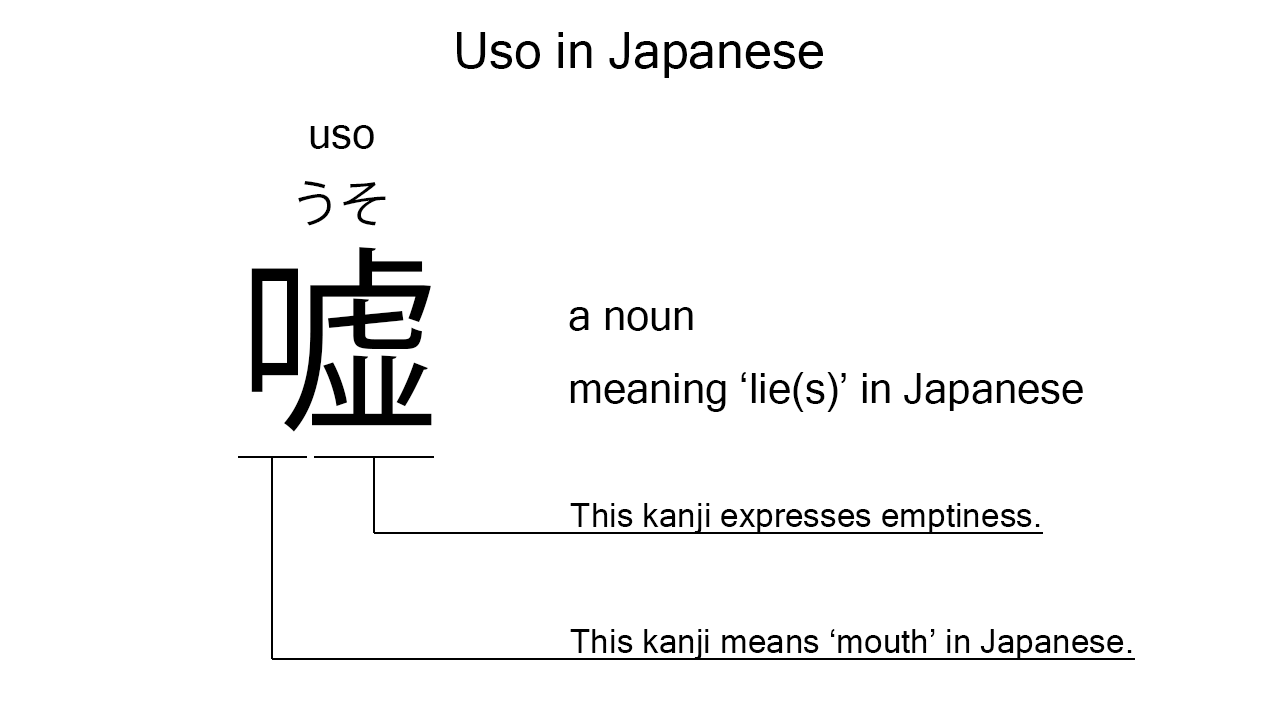What does “uso” mean in Japanese?
Native speakers say “uso” to mean ‘lie’ in Japanese. Perhaps, some Japanese learners know this word as it is sometimes used in Japanese movies, songs, novels, manga, anime, and the like. In this blog post, however, I will explain this word in detail based on its kanji character. And also, I will explain how to use it through example sentences. My explanations would help Japanese learners understand “uso” more clearly. Then, let’s get started!
Contents
Definition and meaning of “uso”
Let me start with the definition and meaning of “uso”.
- uso – 嘘 (うそ) : a noun meaning ‘lie’ in Japanese. This can also work as plural. Learn more about Japanese plural.
Native speakers use this noun to refer to something not true in Japanese. So, its usage is similar to that of the English noun, “lie”, I think.
The definition and meaning are simple and clear. To understand this noun more clearly, however, let me explain its kanji character in detail.
Uso in kanji
The kanji character of “uso” consists of the following two parts:
- 口 : a kanji character used to mean ‘mouth’ in Japanese.
- 虚 : a kanji character used to express emptiness.
These two parts tell us that “uso” literally means ’emptiness from a mouth’ in Japanese. This literal interpretation is not completely in line with the actual meaning, but still understandable, I think. In Japanese, lies are often something empty, something not containing any truth.

When we meet new kanji characters, we should check their parts in detail to understand their meanings clearly and deeply. In many cases, kanji parts tell us a lot about the meanings of the characters they form. Actually, here, we could get the better understanding of “uso” through the detailed check above.
So far, I’ve explained the definition and meaning of “uso” together with its kanji character. Then, let me explain how to use it through the example sentences below.
Example #1: how to say “lies” in Japanese
watashi no kareshi wa tokidoki uso wo tsuku – 私の彼氏は時々嘘をつく (わたしのかれしはときどきうそをつく)
My boyfriend sometimes tells lies.
Below are the new words used in the example sentence.
- watashi – 私 (わたし) : a pronoun meaning ‘I’ in Japanese.
- no – の : a case particle used after a noun or pronoun to make its possessive case. In the example, this is used after “watashi” to make its possessive case, “watashi no“, which means ‘my’ in Japanese.
- kareshi – 彼氏 (かれし) : a noun meaning ‘boyfriend’ in Japanese.
- wa – は : a binding particle working as a case marker or topic marker. In the example, this works after “watashi no kareshi” to make the subject in the sentence.
- tokidoki – 時々 (ときどき) : an adverb of frequency meaning ‘sometimes’ in Japanese.
- wo – を : a case particle used to make the object word in a sentence. In the example, this is used after “uso” to make the object in the sentence.
- tsuku – つく : a verb meaning ‘to let something out from a mouth’ in Japanese.
This is a typical usage of “uso”. In this example, it works as a part of the phrase, “uso wo tsuku”, which means ‘to tell a lie/lies’ or just ‘to lie’ in Japanese. Native speakers sometimes use this phrase in daily conversations.
Example #2: another usage of “uso”
kare wa uso ga suki desu – 彼は嘘が好きです (かれはうそがすきです)
He loves lies.
Below are the new words used in the example sentence.
- kare – 彼 (かれ) : a pronoun meaning ‘he’ in Japanese.
- ga – が : a case particle used to make the subject word or the object word in a sentence. In the example, this is used after “uso” to make the object in the sentence.
- suki – 好き (すき) : the stem part of the na-adjective, “sukina”, which means ‘favorite’ in Japanese. Native speakers, however, often use this as an individual word to mean ‘to like’ or ‘to love’ in Japanese. In the example, this is used to mean ‘to love’.
- desu – です : an auxiliary verb used after a noun or adjective to make it polite. Probably, this is well known as a part of Japanese desu form. In the example, this is used after “suki” to make it sound polite.
This is another typical usage of “uso”. In this example, it works together with the case particle, “ga”, to become the object in the sentence. When we want to say “lie” or “lies” in Japanese, anyway, “uso” is always a very good option.
Summary
In this blog post, I’ve explained the definition and meaning of “uso” in detail based on its kanji character. And also, I’ve explained how to use it through the example sentences. Let me summarize them as follows.
- uso – 嘘 (うそ) : a noun meaning ‘lie’ in Japanese. This can also work as plural. The left part of this kanji means a ‘mouth’; the right part expresses emptiness. So, this kanji character literally means ’emptiness from a mouth’ in Japanese. This literal interpretation is not completely in line with the actual meaning, but still understandable, I think. In Japanese, lies are often something empty, something not containing any truth.
Hope my explanations are understandable and helpful for Japanese learners.